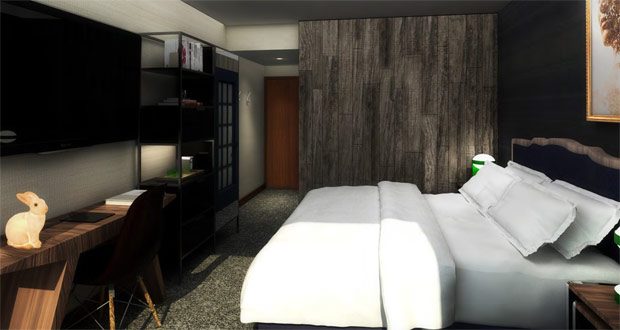Renaissance Hotel is transforming its brand by completely redesigning properties to immerse guests in local cultures. Each design is meant to evoke authenticity through theatricality, novelty, and unscripted elements chosen to tell an area’s story. George Fleck, vice president of global brand marketing and management, Renaissance Hotels, says, “It allows us to be more relevant to locals and amplify a destination versus just another hotel coming to a neighborhood that might not cherish the roots and inspiration of the community.”
While the design principles are staying the same, how they’re interpreted in each property makes them different. “How they’re then interpreted and come to life for each destination comes down to three distinct elements of the design construct: one, the brand principles; two, the local narrative that drives the designs; and three, from a design perspective, being able to deliver on the programming,” Fleck explains.
The design principles are the same as prior to the merger between Starwood and Marriott—the brand’s values of “look and look again, true placemaking, and a high-low mix” tie the different Renaissance experiences together. “This brand inspires stories that are worth retelling and invites guests to potentially go off script from the expected. There are really beautiful ways for us to make you do a double take, and it keeps that curiosity that we want our guests to take away from this design. It anchors you to the local,” Fleck says.

The challenge when choosing themes for the new hotels is how to immerse guests in a city’s culture that is not always the most obvious. While some areas, like Times Square, have obvious elements, in Paris, Fleck explains, “I don’t want to feel like I’m in New York, London, or Berlin. I want to feel like I’m in Paris, and not necessarily see the Eiffel Tower or the Louvre. I want to feel like I’m living for three days in Paris. That’s what makes this such an interesting design proposition.”
Through the brand’s evolution, the idea of novelty and storytelling is important to creating moments that guests will want to retell. Fleck says, “We create moments of novelty to allow the brain to activate this idea of memory and heightened positive experiences to learn something new.”
The Renaissance guestrooms incorporate unscripted elements–when staying at a hotel multiple times, each room gives a different experience so guests feel as though they’re staying somewhere new. “You can really go from one room to another and discover these interesting nuances, and when you put them side-by-side, you can see how similar they are but how different at the same time,” Fleck says.
Sometimes, travelers do not have much time to leave a hotel and explore, so Renaissance is enticing locals to experience the property. “We see our hotels not built for visitors, but that they are part of the DNA of the neighborhood so they attract locals as much as they attract visitors. Our ideal scenario would be if a guest walks in and they immediately feel immersed in the local,” Fleck explains.

In the past 24 months, 15 hotels have been completely transformed, and Renaissance is planning on debuting hotels in 18 new destinations within the next year, including in both the Chelsea and Harlem districts of New York City as well as in Philadelphia. In addition, Renaissance wants to completely change the face of typical airport hotels, drawing inspiration from the city travelers who are visiting or just visited. The brand even announced its transformation at an event at the Joyce Theater in New York City, which put guests on the center stage–literally.
“The brand is excited if the hotel becomes a way for our customers to experience just a touch of something local and guests can feel as though they’ve had a chance to experience the destination without traveling far away from the hotel or having to go outside,” Fleck says. “We do want to go with the balance of what you can and cannot find at the hotel, but we want to merge the two so that they can collect a social and local currency to walk away with a story they can share at their next stop.”
Photos: Renderings of the Renaissance New York Chelsea South Hotel opening in 2019.










